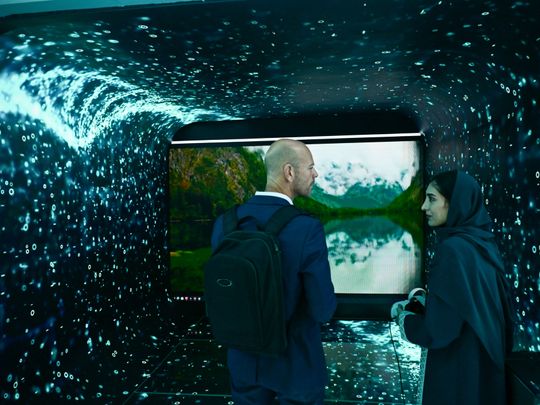
Dubai: Sacred of heights, insects, dogs or anything else? Well, you are not alone as around five to 10 per cent of the population suffer from a type of social phobia or anxiety - and a new virtual reality (VR)-based mental health lab in the UAE will soon help you tackle it.
The Emirates Health Services (EHS) - established by the UAE government to enhance efficiency in the federal health sector - has launched the Immersive Reality Laboratory for Mental Health that works even without a VR headset to treat people suffering from different types of phobias and anxiety. The new service, which has begun its pilot phase at Al Amal Psychiatric Hospital in Dubai, was showcased at the Arab Health 2024 on its inaugural day Monday.
The Lab simulates real-life situations to help therapists assess the level of anxiety and phobia in a controlled environment. It also helps the patients to immediately go back to their “safe place” tailored for their conditions and calm down if they feel stressed with the immersive environment, explained Dr Ammar Humaid Al Banna, director of Al Amal Psychiatric Hospital in Dubai.
Theoretically, Dr Al Banna said, any type of anxiety could be treated if the right protocol is developed.
Prioritising human wellbeing, this initiative is the first of its kind in the Middle East and aims to create a significant advancement in patient care, according to Dr Essam Al Zarooni, acting Executive Director of Clinical Services at EHS.
“The goal is to help create programmes that help patients without the need to leave the hospital,” Dr Al Banna told Gulf News. He said it will be helpful for many since around five to 10 per cent of the population have some anxiety symptoms or phobias, requiring interventions.
How it helps
“The therapist works with the patient inside the immersive lab to create a calming, relaxing experience using generative AI and this experience is going to be unique to that patient. And then from this safe place, [the Lab] gradually exposes them to the anxiety situations until they overcome them in this lab so they will be able to handle them in real life.”
Apart from the visual images on the giant screen, hands-free tactile sensors and smell will be employed to simulate the required environment.
With the use the technological advance, cognitive-behavioral therapy using Augmented Reality is employed to correct thoughts and behaviours. “The technology also aims to train and educate individuals with autism spectrum disorders in social skills through interactive environments.”
Compared to traditional methods, immersive reality psychological therapy technology works towards creating an innovative and interactive therapeutic environment that contributes to the development of advanced and personalised treatment plans for a larger segment of society. This technology can develop treatments for seniors, children, and individuals with sensory and cognitive difficulties such as anxiety, internet addiction, and some behavioural challenges associated with autism.





